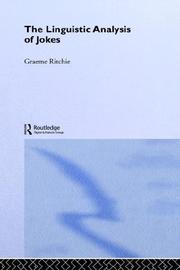| Listing 1 - 2 of 2 |
Sort by
|

ISBN: 1135934452 1280254432 9786610254439 0203643461 9780203643464 0415948584 9781135934408 9781135934446 9781135934453 9780415948586 9780415653275 1135934444 9781280254437 6610254435 Year: 2004 Publisher: New York : Routledge,
Abstract | Keywords | Export | Availability | Bookmark
 Loading...
Loading...Choose an application
- Reference Manager
- EndNote
- RefWorks (Direct export to RefWorks)
This work examines the dramatic changes in American women's comedy performance in the years 1955-1995. The study focuses on the stand-up of Phyllis Diller and Roseanne, and on the character comedy of Lily Tomlin.
Stand-up comedy --- Women comedians --- Comedy --- Joking

ISBN: 0415309832 1134390920 1134390912 0203406958 1280074280 9781134390915 9781280074288 9780203406953 9781134390878 9781134390922 9780415309837 9781138008731 0203350642 1138008737 Year: 2004 Volume: 2 Publisher: London ; New York, NY : Routledge,
Abstract | Keywords | Export | Availability | Bookmark
 Loading...
Loading...Choose an application
- Reference Manager
- EndNote
- RefWorks (Direct export to RefWorks)
This book starts from three observations. First, the use of humour is a complex, puzzling, and idiosyncratically human form of behaviour (and hence is of scientific interest). Second, there is currently no theory of how humour works. Third, one useful step towards a theory of humour is to analyze humorous items in precise detail, in order to understand their mechanisms. The author begins by considering how to study jokes rigorously: the assumptions to make, the guidelines to follow and the pitfalls to avoid. A critique of other work on humour is also provided. This introduces some important concepts, and also demonstrates the lack of agreement about what a theory of humour should look like. The language devices used in various jokes, such as puns or humour based on misinterpretation, are analysed in detail. The central part of the book develops, and demonstrates, proposals for how best to analyze the workings of simple jokes. Finally, the author makes some general suggestions about the language devices that seem to be central to the construction of jokes. The Linguistic Analysis of Jokes will be invaluable for researchers and advanced students of humour research, linguistics and cognitive science.
Discourse analysis, Literary --- Wit and humor --- History and criticism --- Theory, etc --- Humor --- Woordspel --- Woordspelingen --- taalkundige studies --- #KVHA:Taalkunde --- #KVHA:Moppen --- Woordspel. --- Woordspelingen. --- taalkundige studies. --- Analyse du discours littéraire --- Discourse analysis [Literary ] --- Genèse du texte littéraire --- Genèse textuelle --- Tekstgrammatica [Literaire ] --- Bons mots --- Facetiae --- Jests --- Jokes --- Ludicrous, The --- Ridiculous, The --- Wit and humor, Primitive --- Literary discourse analysis --- Discourse analysis, Literary. --- Theory, etc. --- Literature --- Joking --- Laughter --- Rhetoric --- Literary style --- History and criticism&delete& --- Pragmatics --- Taalkundige studies. --- Wit and humor - History and criticism - Theory, etc --- ANALYSE DU DISCOURS LITTERAIRE --- ESPRIT ET HUMOUR --- HISTOIRE ET CRITIQUE --- THEORIE, ETC.
| Listing 1 - 2 of 2 |
Sort by
|

 Search
Search Feedback
Feedback About
About Help
Help News
News